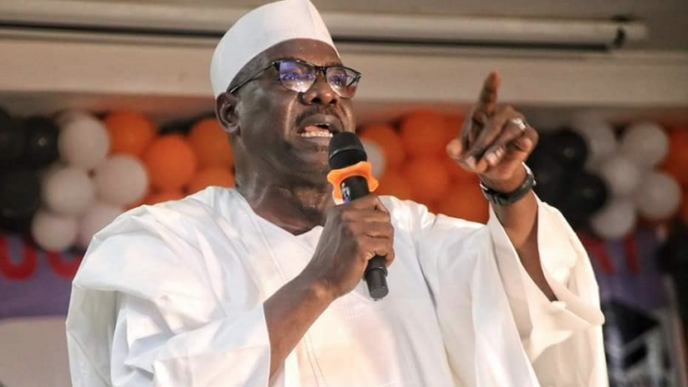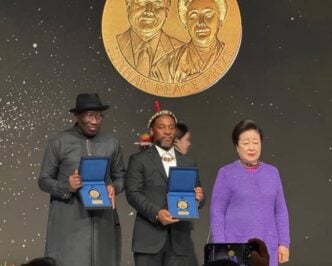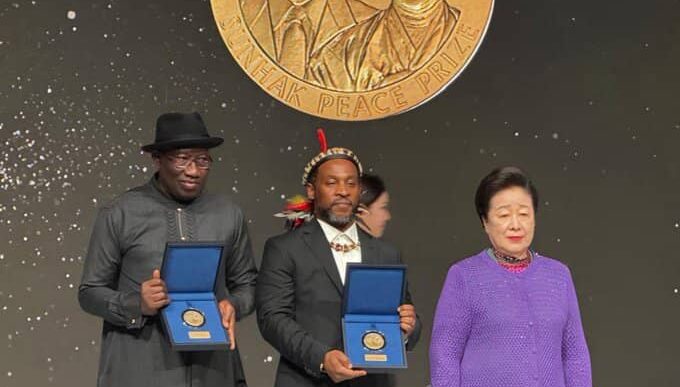Akinwumi Adesina, president of the African Development Bank Group (AfDB), has advised African nations on how to “tariff-proof” their economies and seek strategic partnerships in the ongoing global trade war.
United States President Donald Trump started what has snowballed into a war of tariffs when he announced sweeping global tariffs on all imports into the country.
African countries like Nigeria were slammed with a 14 percent imposition; South Africa and Algeria had 30 percent each; Mauritius had 40 percent, while the small kingdom of Lesotho had as high as 50 percent.
Other nations, including China, and blocs such as the European Union (EU), have since kicked back at the US with retaliatory tariffs.
Advertisement
‘AFRICA RETALIATING WOULD BE UNWISE’
Speaking in Abuja on Friday, Adesina cautioned African countries against imposing retaliatory tariffs against the US, calling for a prioritisation of strategic trade and investment partnerships.
He spoke while delivering the 14th convocation lecture at the National Open University of Nigeria (NOUN).
Advertisement
The lecture had ‘Advancing Africa’s positioning within global development and geopolitical dynamics’ as its theme.
The AfDB president warned that the new US tariffs could send shockwaves through African economies, weakening local currencies, increasing inflation, and raising debt servicing costs.
He emphasised that Africa’s trade with the US is minimal, cautioning that waging a trade war is unwise.
“The cost of servicing debt as a share of global revenue will rise as expected revenues decline. These global tariffs will also have significant indirect effects on Africa, as its exports to developed countries such as China and others in Europe and Asia will buy goods from Africa,” he said.
Advertisement
“This will be expected to reduce the amount of official development assistance that will come to us from those economies. Of course, today we have the Africa Growth and Opportunity Act. It’s a duty-free access of Africa to the rest of the world.”
Adesina urged African nations to “tariff-proof” their economies by focusing on domestic consumption, value addition, and the effective implementation of the African Continental Free Trade Area (AFCTA).
He noted that the era of aid is over, noting that growth must come through disciplined investment, better resource management, and improved governance.
“What is needed is more trade with the US. The current dynamics call for a recalibration of trade and investment between the U.S. and Africa, which would expand trade opportunities, therefore, between the United States and Africa.
Advertisement
“The US has huge opportunities in Africa to invest from rail to ports, to corridors, to agriculture, to processing, to critical minerals. And I think I would like to encourage that there be openness in dialogue on this tariff.
“I asked the minister of finance about that this morning, and that we should prioritise negotiations to make sure that Africa is not underserved in this shifting geopolitically driven economic and investment landscape. Africa should also tariff-proof itself for future jobs.”
Advertisement
INVESTING IN HEALTH, EDUCATION IMPORTANT FOR DEVELOPMENT
Adesina listed education, health, and technology as key sectors that require investments if the continent must develop further.
Advertisement
“There is no doubt that development aid plays a significant role for many economies in Africa, especially providing much-needed support for vulnerable populations that deal with shocks,” he said.
“However, despite its benefits, aid is not the way to develop. Indeed, no nation has ever developed based on aid. Let’s cast our minds back to the challenge of COVID-19. Africa must be 100 percent self-sufficient in the manufacturing of vaccines and medicines.
Advertisement
“In a world where it is becoming increasingly difficult to know allies or where long-time allies suddenly shift their priorities, there is no substitute for self-reliance. Africa must therefore treat health security just like we treat national defense.
“We must ramp up public and private sector financing for research and development. Our universities must be supported very strongly to have world-class medical sciences facilities that will allow our countries to drive cutting-edge innovations in medicine and pharmaceutical sciences,” he added.
“We must then connect them to fuel the growth of medical and pharmaceutical industries.”











